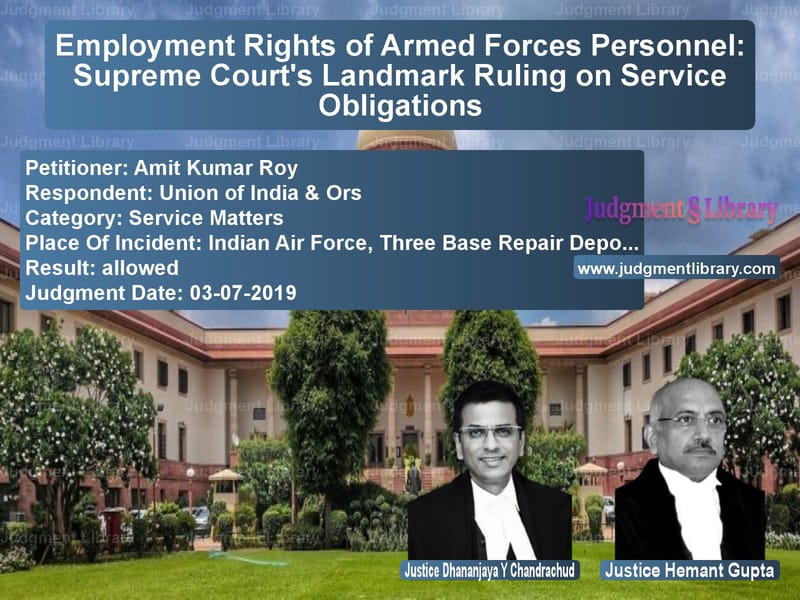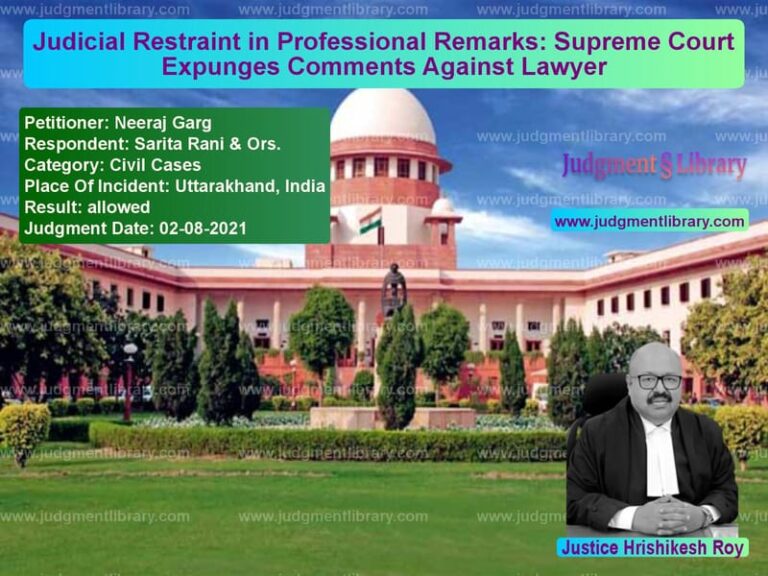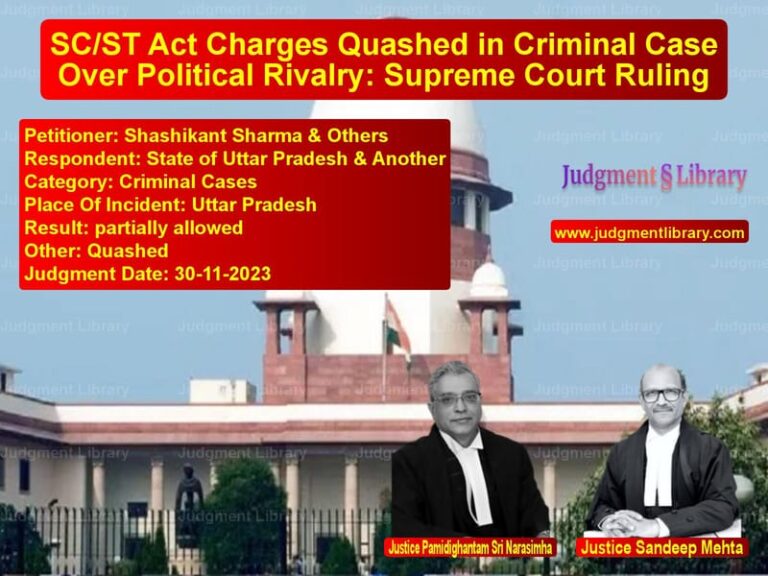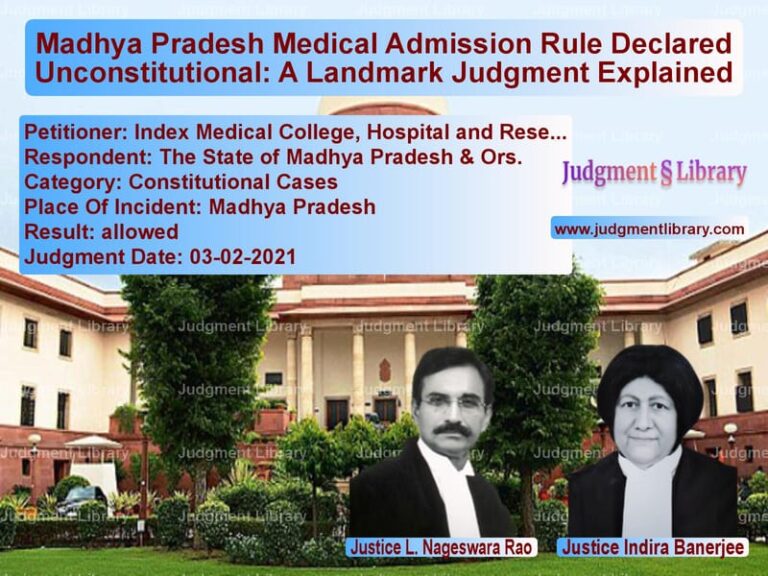Employment Rights of Armed Forces Personnel: Supreme Court’s Landmark Ruling on Service Obligations
The case of Amit Kumar Roy v. Union of India & Ors. is a crucial judgment that examines the rights and obligations of personnel in the Indian Air Force (IAF) regarding employment opportunities outside the military. The Supreme Court analyzed whether an Airman could seek employment in a civilian organization without fulfilling the procedural requirements stipulated under the relevant laws and Air Force Orders. The ruling addressed fundamental questions of service obligations, discipline, and the balance between individual rights and military necessity.
Background of the Case
Amit Kumar Roy was enrolled as an Airman in the IAF on 12 January 2004, with a service engagement extending until 11 January 2024. While serving at Three Base Repair Depot, Roy applied for the position of General Banking Officer at the Bank of India in August 2010. However, he had not completed the mandatory seven years of service nor obtained prior permission from his unit. The IAF authorities cited this as a breach of Air Force Order (AFO) 14/2008, which regulated the application process for civilian employment.
Roy successfully cleared the selection process for the bank and subsequently requested an NOC and discharge on 30 May 2011. The Armed Forces Tribunal (AFT) issued an interim order on 18 August 2011, directing the IAF to provisionally grant an NOC and discharge. Eventually, Air Headquarters issued a provisional NOC on 2 September 2011, leading to Roy’s appointment at the Bank of India on 24 September 2011.
Legal Issues Raised
- Did the appellant have an absolute right under Article 19(1)(g) of the Constitution to leave military service for civilian employment?
- Was the denial of NOC justified under AFO 14/2008?
- Did the appellant’s employment with the Bank of India violate military discipline and service rules?
- Could the Supreme Court exercise its discretionary power under Article 142 to grant relief to the appellant?
Petitioner’s Arguments
Amit Kumar Roy, represented by senior counsel, argued that:
- Fundamental Right to Employment: He had a constitutional right under Article 19(1)(g) to seek employment elsewhere, and service in the Air Force should not impose an undue restriction.
- Compliance with AFO 14/2008: The appellant had fulfilled the conditions of paragraph 17 of AFO 14/2008.
- Equivalence of Pay Scale: The appellant’s position at the Bank of India was equivalent to Group A, as confirmed by an Air Force Order dated 23 July 2015.
- Procedural Irregularity, Not Illegality: The failure to obtain prior permission was only a technical lapse that did not harm the interests of the IAF.
Respondent’s Arguments
The Union of India and IAF authorities, represented by senior counsel, countered that:
- Discipline in Armed Forces: The appellant was bound by the discipline of the Air Force and could not leave service at will.
- Statutory Obligation: Sections 13, 14, and 15 of the Air Force Act, 1950 mandated service obligations, non-compliance with which warranted disciplinary action.
- Violation of AFO 14/2008: The appellant did not follow the required procedure for seeking civilian employment.
- Criticality of Trade: The appellant belonged to the Air Frame Fitter trade, which was considered critical, further justifying the denial of NOC.
Supreme Court’s Analysis
The Supreme Court ruled that personnel in the armed forces do not have an absolute right to leave service at will. The Court emphasized that the right under Article 19(1)(g) is subject to restrictions under Article 33 of the Constitution, which allows Parliament to impose reasonable limitations on fundamental rights for maintaining discipline in the armed forces.
The Court further noted:
- Military service involves obligations that cannot be equated with civilian employment.
- Airmen are bound by the Air Force Act, 1950 and rules that regulate their employment and discharge.
- The appellant’s actions violated AFO 14/2008, which explicitly required prior permission before applying for a civilian job.
- Operational preparedness and manpower planning of the Air Force necessitate strict adherence to service rules.
Equitable Relief Under Article 142
Despite upholding the IAF’s stance on service obligations, the Supreme Court exercised its discretionary power under Article 142 of the Constitution to grant relief. Considering that:
- The appellant had already served more than eight years in the Bank of India.
- His employment at the bank had been uninterrupted since September 2011.
- Ordering his reinduction into the Air Force would serve no practical purpose.
Accordingly, the Court directed that a final NOC and discharge certificate be issued, subject to the appellant depositing Rs 3 lakhs with the Union of India within two months.
Conclusion
The Supreme Court’s ruling in this case strikes a balance between the discipline of military service and the individual’s employment rights. While reaffirming that armed forces personnel are bound by service rules, the Court provided equitable relief recognizing the appellant’s long-standing civilian employment. This judgment serves as an important precedent in cases involving employment rights of defense personnel seeking transition to civilian roles.
Petitioner Name: Amit Kumar Roy.Respondent Name: Union of India & Ors.Judgment By: Justice Dhananjaya Y Chandrachud, Justice Hemant Gupta.Place Of Incident: Indian Air Force, Three Base Repair Depot.Judgment Date: 03-07-2019.
Don’t miss out on the full details! Download the complete judgment in PDF format below and gain valuable insights instantly!
Download Judgment: Amit Kumar Roy vs Union of India & Ors Supreme Court of India Judgment Dated 03-07-2019.pdf
Direct Downlaod Judgment: Direct downlaod this Judgment
See all petitions in Employment Disputes
See all petitions in Termination Cases
See all petitions in Judgment by Dhananjaya Y Chandrachud
See all petitions in Judgment by Hemant Gupta
See all petitions in allowed
See all petitions in supreme court of India judgments July 2019
See all petitions in 2019 judgments
See all posts in Service Matters Category
See all allowed petitions in Service Matters Category
See all Dismissed petitions in Service Matters Category
See all partially allowed petitions in Service Matters Category







